Explore a Great Career in Nuclear Energy
 What better way to celebrate National Nuclear Science Week than to acknowledge amazing career opportunities that exist for people interested in joining the nuclear renaissance. If you are a middle or high school student (or are the parent of one) considering college alternatives, you would be hard pressed to find a better investment than earning an associates or bachelors degree in nuclear-related science, engineering, or technology.
What better way to celebrate National Nuclear Science Week than to acknowledge amazing career opportunities that exist for people interested in joining the nuclear renaissance. If you are a middle or high school student (or are the parent of one) considering college alternatives, you would be hard pressed to find a better investment than earning an associates or bachelors degree in nuclear-related science, engineering, or technology.
Opportunities for entry level positions have not been this rich at any time during the past three decades, and the nuclear industry is partnering with many schools to ensure graduates have the knowledge and skill for success as power plant engineers, operators, and technicians. Because of a combination of national and international trends, there have never been more opportunities for young people to begin careers in the nuclear industry.
About 120,000 people are currently employed in the U.S. nuclear industry. Over the next several years, many of these workers will retire. As a result, the industry will need to hire more than 25,000 new employees just to maintain the existing workforce. The economic slowdown over the past few years has caused many workers to delay their retirement.
 Today retirements are once again on the rise because 401K balances have recovered and workers have earned additional credits in pension plans. For example, in 2011 about 2,000 workers retired from the 104 operating nuclear plants in the United States, prompting many utilities to increase hiring. Four new nuclear plants being built in Georgia and South Carolina will each add up to 2,400 workers during construction, plus 400 to 700 permanent jobs when each is operating. In addition, the nuclear industry is booming overseas with more than 60 plants under construction around the world and many more planned. All of this means ample opportunities for rewarding careers in many nuclear related fields.
Today retirements are once again on the rise because 401K balances have recovered and workers have earned additional credits in pension plans. For example, in 2011 about 2,000 workers retired from the 104 operating nuclear plants in the United States, prompting many utilities to increase hiring. Four new nuclear plants being built in Georgia and South Carolina will each add up to 2,400 workers during construction, plus 400 to 700 permanent jobs when each is operating. In addition, the nuclear industry is booming overseas with more than 60 plants under construction around the world and many more planned. All of this means ample opportunities for rewarding careers in many nuclear related fields.
 The industry hires almost every type of engineer, not just nuclear engineers. The most common are mechanical, electrical, civil, and power systems engineers. Since there are engineering colleges and universities in every state that offer one or more of these degree programs, opportunities are plentiful. Earning a bachelors degree in these engineering majors opens the door to an entry-level engineer position with a starting salary of approximately $60,000 to $65,000.
The industry hires almost every type of engineer, not just nuclear engineers. The most common are mechanical, electrical, civil, and power systems engineers. Since there are engineering colleges and universities in every state that offer one or more of these degree programs, opportunities are plentiful. Earning a bachelors degree in these engineering majors opens the door to an entry-level engineer position with a starting salary of approximately $60,000 to $65,000.
Some of the positions in greatest demand at nuclear plants are power plant operators and technicians. These opportunities generally require an associate's degree or equivalent training. Starting salaries range from around $45,000 per year to about $50,000. As workers gain experience, salaries can rise $20,000 or higher to an average of $65,000 to $70,000, and overtime pay often adds thousands more to annual income.
 In the past, finding a college that offered education courses for future operators and technicians could be difficult, but this is no longer the case. Several years ago the industry began working with colleges across the United States to create new degree programs. Today there are more than 40 community colleges around the U.S. offering what is known as the Nuclear Uniform Curriculum (NUCP). The NUCP is a standardized associates degree program that prepares students for careers as nuclear operators and technicians. Students who earn a B grade or better in their core courses are awarded a transferable certificate that is recognized at all 104 nuclear plants.
In the past, finding a college that offered education courses for future operators and technicians could be difficult, but this is no longer the case. Several years ago the industry began working with colleges across the United States to create new degree programs. Today there are more than 40 community colleges around the U.S. offering what is known as the Nuclear Uniform Curriculum (NUCP). The NUCP is a standardized associates degree program that prepares students for careers as nuclear operators and technicians. Students who earn a B grade or better in their core courses are awarded a transferable certificate that is recognized at all 104 nuclear plants.
For workers interested in advancing into leadership roles, these positions in engineering, operations, and other technical fields are excellent starting points for future management positions.
According to the College Board, the national average for community college tuition and fees is about $3,000 per year. Thus, for about $6,000 a student with a solid math and science background can attend an NUCP school for two years and earn an associates degree and a transferable credential. This would qualify them for an entry-level position as an operator or technician earning a starting salary of $45,000 to $50,000. This is certainly one of the greatest deals in education today!
More information on careers in the nuclear industry is available from the American Nuclear Society, the Nuclear Energy Institute, and at Get Into Energy.
__________________________________
John Wheeler is the Workforce Planning Manager for Entergy. He also is an American Nuclear Society member and, separately, is the producer of This Week in Nuclear, a podcast and blog about the peaceful uses of nuclear energy.



